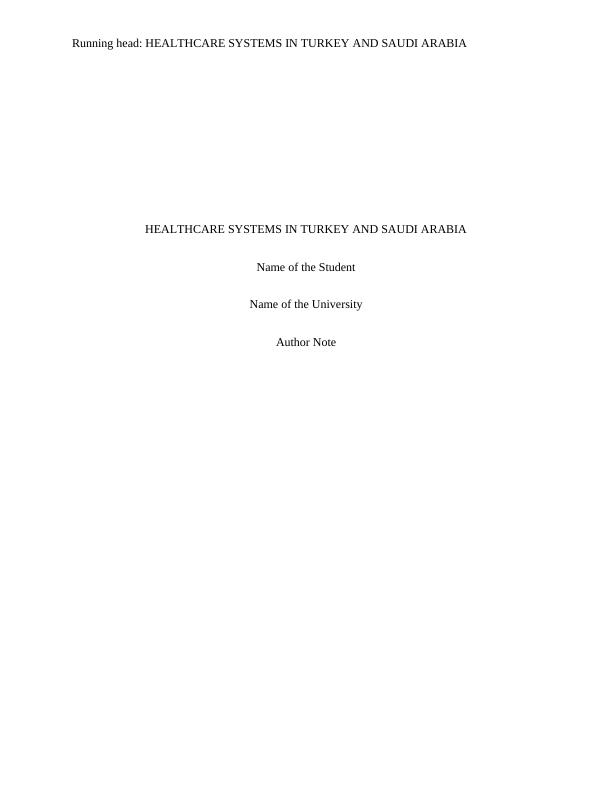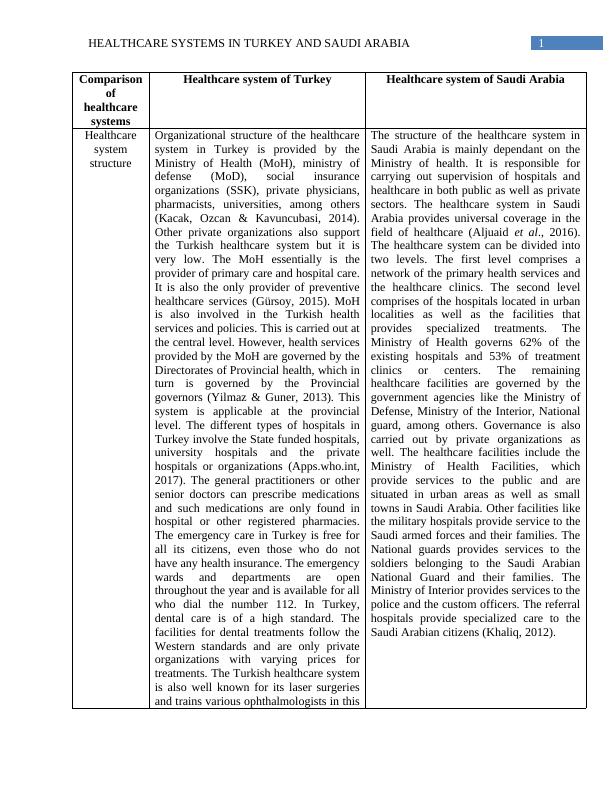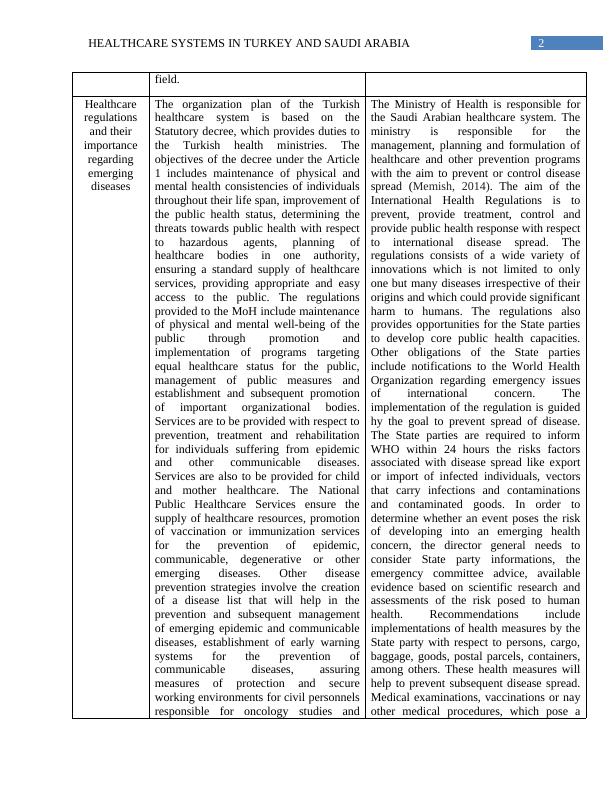Healthcare Systems in Turkey and Saudi Arabia
7 Pages2366 Words164 Views
Added on 2020-03-16
Healthcare Systems in Turkey and Saudi Arabia
Added on 2020-03-16
ShareRelated Documents
Running head: HEALTHCARE SYSTEMS IN TURKEY AND SAUDI ARABIAHEALTHCARE SYSTEMS IN TURKEY AND SAUDI ARABIAName of the StudentName of the UniversityAuthor Note

1HEALTHCARE SYSTEMS IN TURKEY AND SAUDI ARABIAComparisonofhealthcaresystemsHealthcare system of TurkeyHealthcare system of Saudi ArabiaHealthcaresystemstructureOrganizational structure of the healthcaresystem in Turkey is provided by theMinistry of Health (MoH), ministry ofdefense (MoD), social insuranceorganizations (SSK), private physicians,pharmacists, universities, among others(Kacak, Ozcan & Kavuncubasi, 2014).Other private organizations also supportthe Turkish healthcare system but it isvery low. The MoH essentially is theprovider of primary care and hospital care.It is also the only provider of preventivehealthcare services (Gürsoy, 2015). MoHis also involved in the Turkish healthservices and policies. This is carried out atthe central level. However, health servicesprovided by the MoH are governed by theDirectorates of Provincial health, which inturn is governed by the Provincialgovernors (Yilmaz & Guner, 2013). Thissystem is applicable at the provinciallevel. The different types of hospitals inTurkey involve the State funded hospitals,university hospitals and the privatehospitals or organizations (Apps.who.int,2017). The general practitioners or othersenior doctors can prescribe medicationsand such medications are only found inhospital or other registered pharmacies.The emergency care in Turkey is free forall its citizens, even those who do nothave any health insurance. The emergencywards and departments are openthroughout the year and is available for allwho dial the number 112. In Turkey,dental care is of a high standard. Thefacilities for dental treatments follow theWestern standards and are only privateorganizations with varying prices fortreatments. The Turkish healthcare systemis also well known for its laser surgeriesand trains various ophthalmologists in thisThe structure of the healthcare system inSaudi Arabia is mainly dependant on theMinistry of health. It is responsible forcarrying out supervision of hospitals andhealthcare in both public as well as privatesectors. The healthcare system in SaudiArabia provides universal coverage in thefield of healthcare (Aljuaid et al., 2016).The healthcare system can be divided intotwo levels. The first level comprises anetwork of the primary health services andthe healthcare clinics. The second levelcomprises of the hospitals located in urbanlocalities as well as the facilities thatprovides specialized treatments. TheMinistry of Health governs 62% of theexisting hospitals and 53% of treatmentclinics or centers. The remaininghealthcare facilities are governed by thegovernment agencies like the Ministry ofDefense, Ministry of the Interior, Nationalguard, among others. Governance is alsocarried out by private organizations aswell. The healthcare facilities include theMinistry of Health Facilities, whichprovide services to the public and aresituated in urban areas as well as smalltowns in Saudi Arabia. Other facilities likethe military hospitals provide service to theSaudi armed forces and their families. TheNational guards provides services to thesoldiers belonging to the Saudi ArabianNational Guard and their families. TheMinistry of Interior provides services to thepolice and the custom officers. The referralhospitals provide specialized care to theSaudi Arabian citizens (Khaliq, 2012).

2HEALTHCARE SYSTEMS IN TURKEY AND SAUDI ARABIAfield.Healthcareregulationsand theirimportanceregardingemergingdiseasesThe organization plan of the Turkishhealthcare system is based on theStatutory decree, which provides duties tothe Turkish health ministries. Theobjectives of the decree under the Article1 includes maintenance of physical andmental health consistencies of individualsthroughout their life span, improvement ofthe public health status, determining thethreats towards public health with respectto hazardous agents, planning ofhealthcare bodies in one authority,ensuring a standard supply of healthcareservices, providing appropriate and easyaccess to the public. The regulationsprovided to the MoH include maintenanceof physical and mental well-being of thepublic through promotion andimplementation of programs targetingequal healthcare status for the public,management of public measures andestablishment and subsequent promotionof important organizational bodies.Services are to be provided with respect toprevention, treatment and rehabilitationfor individuals suffering from epidemicand other communicable diseases.Services are also to be provided for childand mother healthcare. The NationalPublic Healthcare Services ensure thesupply of healthcare resources, promotionof vaccination or immunization servicesfor the prevention of epidemic,communicable, degenerative or otheremerging diseases. Other diseaseprevention strategies involve the creationof a disease list that will help in theprevention and subsequent managementof emerging epidemic and communicablediseases, establishment of early warningsystems for the prevention ofcommunicable diseases, assuringmeasures of protection and secureworking environments for civil personnelsresponsible for oncology studies andThe Ministry of Health is responsible forthe Saudi Arabian healthcare system. Theministry is responsible for themanagement, planning and formulation ofhealthcare and other prevention programswith the aim to prevent or control diseasespread (Memish, 2014). The aim of theInternational Health Regulations is toprevent, provide treatment, control andprovide public health response with respectto international disease spread. Theregulations consists of a wide variety ofinnovations which is not limited to onlyone but many diseases irrespective of theirorigins and which could provide significantharm to humans. The regulations alsoprovides opportunities for the State partiesto develop core public health capacities.Other obligations of the State partiesinclude notifications to the World HealthOrganization regarding emergency issuesof international concern. Theimplementation of the regulation is guidedhy the goal to prevent spread of disease.The State parties are required to informWHO within 24 hours the risks factorsassociated with disease spread like exportor import of infected individuals, vectorsthat carry infections and contaminationsand contaminated goods. In order todetermine whether an event poses the riskof developing into an emerging healthconcern, the director general needs toconsider State party informations, theemergency committee advice, availableevidence based on scientific research andassessments of the risk posed to humanhealth. Recommendations includeimplementations of health measures by theState party with respect to persons, cargo,baggage, goods, postal parcels, containers,among others. These health measures willhelp to prevent subsequent disease spread.Medical examinations, vaccinations or nayother medical procedures, which pose a

End of preview
Want to access all the pages? Upload your documents or become a member.
Related Documents
Factors Influencing Level of Health Cover Awareness in Saudi Arabialg...
|22
|5220
|29
Healthcare Systems Around the Worldlg...
|4
|847
|486
Assignment on Healthcare System 2022lg...
|4
|1307
|25
Treatment of Heart Diseases in Private Hospitalslg...
|13
|3550
|247
Healthcare System in Saudi Arabia: A Comparison between Non-Profit and For-Profit Sectorslg...
|8
|1671
|432
Ministry of Health of Saudi Arabialg...
|6
|1534
|286
